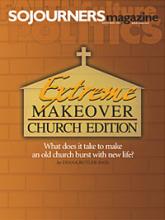Shiloh Baptist Church sits squarely on the corner of 9th and P Streets in northwest Washington, D.C., a grand and dignified fixture in the city’s Shaw neighborhood—a community that has seen its fair share of unemployment, drug abuse, and skyrocketing housing prices. On a fall Sunday morning, the church is bursting with electricity, its 1,300-seat sanctuary nearly full with several choirs leading the congregation in praise and “hallelujahs.” In the sanctuary around them, stained glass windows, based on tribal patterns of southern Africa, are among the reflections of the church’s 142-year history and its beginnings as a congregation of free and enslaved African Americans.
The church, one of the oldest African-American congregations in D.C., is biblical in its theology, with a strong sense of mission, hospitality, and service. Rev. Wallace Charles Smith, Shiloh’s senior minister (and Sojourners board member), reminds worshippers during his sermon to remember whose they are. “Jesus’ blood has signed my name,” he says. “What is the inscription on your life?” “The Shiloh Spirit,” the weekly bulletin supplement, announces the congregation’s focus on spiritual disciplines; for the next several months members will read Richard Foster’s Celebration of Discipline and talk about its themes of inward, outward, and corporate discipleship at the church’s Thursday night Bible studies.
Read the Full Article

